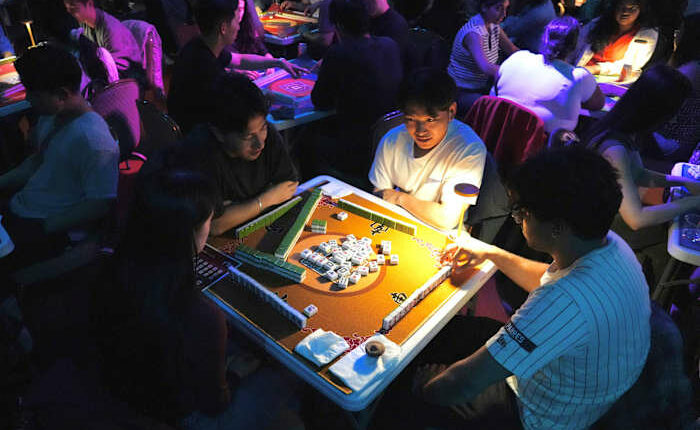Share this @internewscast.com

SAN FRANCISCO – Two years ago, when Ryan Lee tried mahjong for the first time, he quickly became captivated. He found sets of the traditional Chinese tile game at his parents’ home and decided to transport them to San Francisco, where he initiated mahjong nights at his apartment.
These gatherings became so well-liked that the 25-year-old Chinese American started organizing pop-up mahjong events in various venues such as restaurants, bars, and nightclubs across San Francisco.
Originating in 19th century China, mahjong is experiencing a resurgence among a new wave of players eager to disconnect from their devices and interact face-to-face.
Lee’s Youth Luck Leisure (YLL) Mahjong Club now organizes bi-monthly events featuring up to 30 tables and 200 participants. These events draw a dynamic, youthful crowd enticed by the lively vibe, music from DJs, unique cocktails, and the opportunity to meet new people. There are also instructors available to help beginners learn the game.
“Many are just fascinated even if they haven’t mastered the game yet,” Lee noted. “They’re seeking a connection to the cultural aspect. It brings a sense of cultural nostalgia.”
Eventbrite reports there was a 179% increase in U.S. mahjong events on its platform from 2023 to 2024.
According to Eventbrite, a widely-used ticketing platform, there has been a 179% rise in mahjong events from 2023 to 2024 in the U.S. The platform also highlights that Gen Z is increasingly interested in other “grannycore” pursuits like baking classes and needlework gatherings, which are enjoyed offline.
In mahjong, four players draw and discard tiles with different suits, numbers and Chinese characters. The object is to build a winning hand of four sets of three and one pair.
“It’s a really tactile game, and it’s really a social game. It really easily builds community among people,” said Nicole Wong, a writer and audio producer in Oakland. “It’s a good way to unplug and not just be on your phone.”
Wong learned how to play when she visited her Chinese grandparents in New Zealand in 2009. Several years ago she found her parents’ mahjong table and game sets, and started hosting mahjong nights with her friends.
In 2019, she launched The Mahjong Project, an instructional guide and oral history project inspired by her family’s love of the game. That led her to publish “Mahjong: House Rules from Across the Asian Diaspora,” an illustrated book that explores the game’s history, strategies, traditions and styles of play.
“For the Asian American community, I think there’s interest in connecting to your heritage and your culture in a way that was not the case when I was growing up,” Wong said.
YLL Mahjong Club has held nearly 20 events in San Francisco since it started last year. Lee said it’s an opportunity to introduce people to the game as well as bring business to local restaurants, bars and food vendors. Lee’s sister started hosting similar events in Los Angeles. There are plans to expand to other U.S. cities.
“The demand is rising,” said Lee, a management consultant in business school. “It’s not just an interest to learn how to play mahjong, but to find a third space or another community to do things with.”
Joyce Yam, YLL Mahjong Club’s sponsorship manager, helps manage the San Francisco events, which sell out fast and have long waiting lists.
“We welcome people who have no experience at mahjong at all, and we have TA’s who teach the people how to play the game. And they love it so much that they keep coming back,” Yam said.
Ethan Vuong, a Florida native who lives in San Francisco, started playing with friends a couple years ago. He saw it as a way to connect with his Chinese heritage and make new friends. He’s a regular at Oakland’s Baba House and YLL Mahjong Club events, where he volunteers to teach newcomers.
“It’s not just a skill or mechanics-based game, it’s an expression of your personality,” Vuong said. “I just keep playing because I have this goal that I’m going to beat my grandma one day.”
Copyright 2025 The Associated Press. All rights reserved. This material may not be published, broadcast, rewritten or redistributed without permission.












